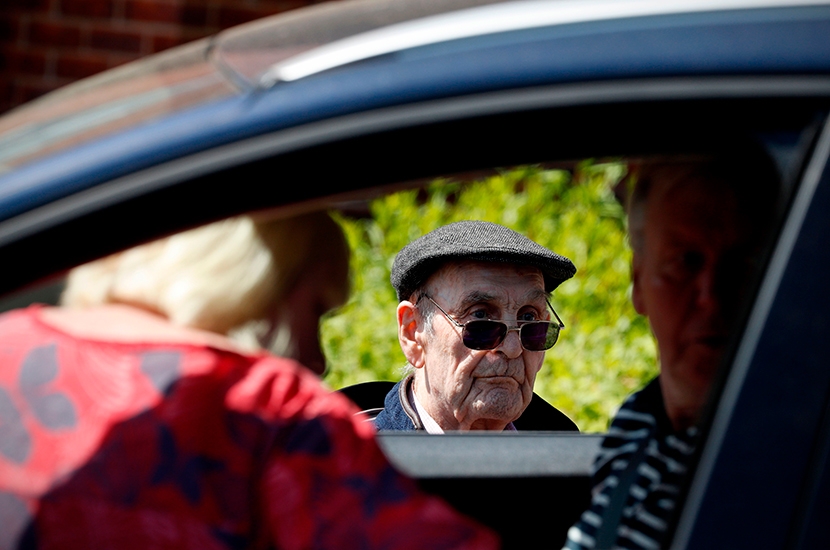There’s a lot I don’t know about care home visits during this pandemic. I don’t know how straightforward it would be to find a way for close relatives to make proper and regular visits to the very frail. I don’t know details of the arrangements for staff in those care homes to work there and go home afterwards, as hospital staff do too. I don’t know the floor-plans of the thousands of care homes in the United Kingdom, nor how each could be adapted to allow high-priority visits from a relative. There are some 15,000 homes in England alone, and some half a million old people living in them.
I don’t know how the management or staff of these homes would view making it easier for visits by relatives, or whether they would have the staffing to arrange this. I don’t know what estimates the Scientific Advisory Group for Emergencies has made (please God don’t tell me they haven’t tried) of the risks of opening up care homes to priority visits by nominated close relatives. And I don’t know what discussions there have been within cabinet about what more we could do.
Here, though, is one thing I do know. After they are all dead, we shall look back on how we treated the institutionalised elderly in this year of Covid-19, and be ashamed.
One shouldn’t disregard obstacles, of course. But it’s amazing what a difference it makes when you start with a total determination to find a way through. Where there’s a will there’s so often a way, and that’s true of many of our biggest challenges. We have discovered, for instance, that there is, after all, a magic money tree. The pitiful situation of our oldest and most helpless citizens is another of those challenges where, if we could find the will, we could find a way.

My 93-year-old mother died in Spain in March — of old age, really. I had four days to try to get to her bedside, and couldn’t. At least Mum understood; and my sisters were with her to explain. But what if she had been unable to figure it out? Mum, alone and dying, her eldest son inexplicably absent, and nurses shouting at her: ‘He can’t come, he isn’t allowed!’ So I know how it feels, and how it is for many families who lost an elderly relative this year — knowing there was nothing more they were allowed to do, and yet still feeling vaguely guilty.
The government is now belatedly talking about tweaking the guidelines. Depressingly, the ‘advice’ (4 November) starts: ‘Visits… should prioritise residents’ and staff’s safety.’ Well, of course safety matters, but so do love and compassion. The miseries now inflicted for safety’s sake should be weighed against that, and every last extra precaution should not automatically trump the death in loneliness of tens of thousands. People are hanging on, imprisoned, wretched, confused — and in their last months abandoned (as they might suppose) by those who they thought loved them. The oldest among us are at the same time most in need of real contact with those they know best, and least able to understand why it is denied.
People are hanging on, imprisoned, wretched, confused – and in their last months abandoned
If we can — as we should — accept slightly increased risks in order not to deny schooling to young children, can we not do the same for those at the other end of their lives? People like me who argue for loosening restrictions to protect livelihoods are all too familiar with being preached at by critics who ask if we’re prepared to kill granny to boost GDP. Maybe we should ask them if they’re prepared to curse the closing scenes of 10,000 grannies’ lives for a notional decimal point in a notional R-number. Granny might just prefer a hug.
The new ‘guidance’ encourages care homes to do their best to allow visits if they are safe — then witters idiotically (not least for the bedbound) about ‘floor-to-ceiling screens, visiting pods, and window visits’. Here, then, is the experience of one young man (29) in my part of Derbyshire. I asked him about trying to visit his grandfather.
‘Grandad had been living independently but was losing his bearings and lockdown made it worse. He moved into care. At first, visits in the garden were permitted, but after a resident tested positive for coronavirus that was stopped. I could speak to my grandad through the window that opened a few inches, though he pushed at it, trying to open it wider.
‘He’d escaped once by climbing on a table and removing a safety mechanism. We couldn’t make him understand why he was locked in and he looked desperately at us, scared. I felt like I was at a zoo and I think he did too. Though I tried to stop him, he went to the front door to escape. I could only stand at the locked outer door, he across a lobby in a dark hallway behind another set of locked doors. He pushed on the doors as a carer tried to comfort him. I stuck my thumbs up to comfort him, he stuck his thumbs up to comfort me.
‘I haven’t seen him since. He’s now back in hospital with another infection and lockdown rules prevent any visits. He won’t eat, drink or take medicine, and nurses ask my parents to encourage him to, but over the phone he doesn’t recognise who they are. There’s no provision for video calls.
‘With my parents we managed to contact him by phone on Saturday and he recognised our voices but he sounded so ill and confused that at first I barely recognised his. I feel like lockdown has taken my grandad from me.
‘Covid,’ says my friend, bitterly, ‘would almost be a blessing.’
I could make suggestions — maybe the designation of a single close relative who would be offered the same protections a care-worker gets — but I’d fast be out of my depth. So I’ll say just this. I’m sure that if we tried hard enough, we could find a way. And if we don’t, then it will be to the abiding sorrow of millions. It will discredit us.







Comments